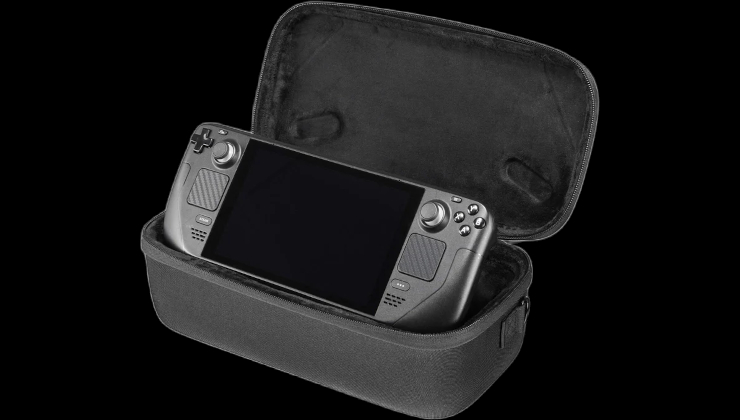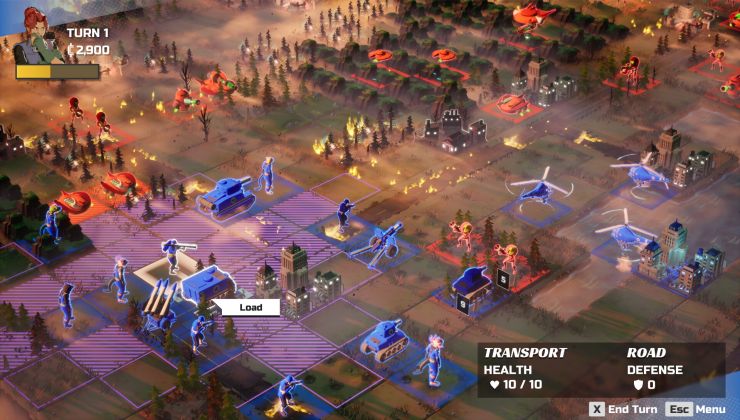Shared on a Chinese news website, one lucky recipient of the Steam Deck developer kit decided to show off some benchmarks although they probably weren't supposed to.
We already knew that the Steam Deck had some pretty impressive internals, and that Valve had said it's "the most powerful gaming handheld in the world" in their YouTube advert. However, we've not really seen any good numbers until now.
Something to remember is that this is a dev kit, and so tweaks are likely to be made before the consumer units go out. Not only that but plenty of developers will no doubt be tweaking their games ahead of time. There will also be multiple updates to the Steam Play Proton compatibility layer before release too for running Windows games on it.
Anyway, here's what they tested and how they ran. Sadly we don't know the exact settings they used in some places so we've mentioned "tweaked" for those:
| Game | Setting: FPS |
| Shadow of the Tomb Raider |
Highest: 30 FPS |
| DOOM (2016) | Higher (tweaked): 46 FPS Medium: 60 FPS |
| Cyberpunk 2077 | High: 20 - 30 FPS |
| Dota 2 | Highest: 47 FPS Low: 80 FPS |
One concern seems to be how hot it got after playing Cyberpunk. Not a very realistic game to be playing on High settings on the Steam Deck though. The user showed using a digital thermometer the back hit 42.6°C (108.68°F) and the grips stayed around 29°C (84.2°F).
A reminder on some of the specifications:
- Compute
- CPU: AMD APU Zen 2 4c/8t, 2.4-3.5GHz (up to 448 GFlops FP32)
- GPU: 8 RDNA 2 CUs, 1.0-1.6GHz (up to 1.6 TFlops FP32)
- APU power: 4-15W
- 16 GB LPDDR5 on-board RAM (5500 MT/s quad 32-bit channels)
- Storage (three models)
- 64 GB eMMC (PCIe Gen 2 x1)
- 256 GB NVMe SSD (PCIe Gen 3 x4)
- 512 GB high-speed NVMe SSD (PCIe Gen 3 x4)
- Display
- Resolution: 1280 x 800px (16:10 aspect ratio)
- Type: Optically bonded IPS LCD for enhanced readability
- Display size: 7" diagonal touch-screen
- Brightness: 400 nits typical
- Refresh rate: 60Hz
- Ambient light sensor
Can't even begin to explain how excited I am to get my unit through sometime in Q1 2022.
Last edited by Mohandevir on 30 Sep 2021 at 3:40 pm UTC
Quoting: MohandevirI wonder if they'll add AMD FRS support to Proton and do some upscale to 800p... Did that with Witcher 3 and F1 2021 (900p upscaled to 1080p). It lowered my GPU temps by 10°-15° (probably not going to happen on an APU) while giving me a performance boost with no noticeable visual impacts. In fact, imo, the contrasts looked better and it solved my fan noise issues.A more likely use case for FSR than games running on the internal display is to scale up the image when the device is docked and avoid a performance hit.
The only concern now is the battery time, if it lasts for at least 3 hours then it's already a success in my book :)
Quoting: GuestOT:Yes. One of the custom Protons (I think GE?) has it automatically for the part that scales the window size to the display size (FSHack), and gamescope does the same conversion: they've already said that they're interested in having FSR available as a scaling method there. Vulkan-only, I think, and it doesn't work if the game has its own scaling, and it makes the UI blurry if you do it outside of the game.
Is there a way to inject FSR in games that do not support it natively, maybe through vkBasalt?
Quoting: ShmerlCDPR are welcome to tweak their Stadia version of CP2077 and make a native release for Steam Deck ;)Does anybody have an idea if [this](https://news.ycombinator.com/item?id=25370070) could be legit?
Quoting: CatKillerOne doesn't prevent the other. I mean, for edge cases like CP2077, FSR could help raise the fps counter for a smoother overall experience, on the native screen.Quoting: MohandevirI wonder if they'll add AMD FRS support to Proton and do some upscale to 800p... Did that with Witcher 3 and F1 2021 (900p upscaled to 1080p). It lowered my GPU temps by 10°-15° (probably not going to happen on an APU) while giving me a performance boost with no noticeable visual impacts. In fact, imo, the contrasts looked better and it solved my fan noise issues.A more likely use case for FSR than games running on the internal display is to scale up the image when the device is docked and avoid a performance hit.
Quoting: CatKillerPersonally, I followed this "How to":Quoting: GuestOT:Yes. One of the custom Protons (I think GE?) has it automatically for the part that scales the window size to the display size (FSHack), and gamescope does the same conversion: they've already said that they're interested in having FSR available as a scaling method there. Vulkan-only, I think, and it doesn't work if the game has its own scaling, and it makes the UI blurry if you do it outside of the game.
Is there a way to inject FSR in games that do not support it natively, maybe through vkBasalt?
[Forbes: AMD FSR via ProtonGE](https://www.forbes.com/sites/jasonevangelho/2021/09/23/how-steam-gamers-are-doubling-their-fps-without-a-gpu-upgrade/?sh=3bb13d969cd8)
Quoting: MohandevirOne doesn't prevent the other. I mean, for edge cases like CP2077, FSR could help raise the fps counter for a smoother overall experience, on the native screen.Sure, and once you've got the framework in place you could use it either way, but if you've got less than 1280×800 pixels available, that's not a lot of information to work with to make the image look good; you'd probably rather turn something else down other than the resolution to get better performance. Whereas having the same performance docked as not, and having an image that doesn't look too terrible, would be universally pretty useful.
Quoting: CatKillerIt might be something easier to implement with an officially supported build, optimized for the Steam Deck? Something like variable resolution, depending on the screen's output resolution (native or external)?Quoting: MohandevirOne doesn't prevent the other. I mean, for edge cases like CP2077, FSR could help raise the fps counter for a smoother overall experience, on the native screen.Sure, and once you've got the framework in place you could use it either way, but if you've got less than 1280×800 pixels available, that's not a lot of information to work with to make the image look good; you'd probably rather turn something else down other than the resolution to get better performance. Whereas having the same performance docked as not, and having an image that doesn't look too terrible, would be universally pretty useful.
Quoting: MohandevirIt might be something easier to implement with an officially supported build, optimized for the Steam Deck? Something like variable resolution, depending on the screen's output resolution (native or external)?Gamescope already sits between the game surface and the display surface, and can happily lie to either of them as it sees fit (hence being able to easily cap the framerate at 30 fps if you want to, to save battery). It should be pretty straightforward to slot FSR in there as an automatic scaling method. There are already a couple to choose from.
Quoting: CatKillerForgot about that piece of tech. Looking forward to see it in action. Didn't know it could be used for "FSR Scaling". Awesome!Quoting: MohandevirIt might be something easier to implement with an officially supported build, optimized for the Steam Deck? Something like variable resolution, depending on the screen's output resolution (native or external)?Gamescope already sits between the game surface and the display surface, and can happily lie to either of them as it sees fit (hence being able to easily cap the framerate at 30 fps if you want to, to save battery). It should be pretty straightforward to slot FSR in there as an automatic scaling method. There are already a couple to choose from.
Edit: Forgot that CP2077 was tested at High preset... 20-30fps in those conditions is already surprising for such a device... I expected that kind of performances... At low preset.
Last edited by Mohandevir on 30 Sep 2021 at 6:36 pm UTC
Quoting: MohandevirForgot about that piece of tech. Looking forward to see it in action. Didn't know it could be used for "FSR Scaling". Awesome!Well, it can't yet, as far as we know, but they said that they're interested.
https://github.com/Plagman/gamescope/issues/215#issuecomment-885932306
Yes, FSR is potentially something we'd be interested in.Last edited by CatKiller on 30 Sep 2021 at 6:37 pm UTC
Quoting: GuestOT:With Proton-GE you can use the
Is there a way to inject FSR in games that do not support it natively, maybe through vkBasalt?
WINE_FULLSCREEN_FSR=1 %command% on your launch options to enable FSR in most titles. I tried it on Control and Shadow of War. Image is blurry in 1080p but before DLSS comes to Control this is the way to increase the FPS for me. You can adjust the sharpness with the number. It can be between 0-5. I'm using 0 in Shadow of War and my eyes are pretty adjusted to it. Performance gain is more like 10-20 FPS in this setting for me but it a gain nonetheless.
Quoting: EikeI have no way to check if it's legit, but it's not hard to imagine. Stadia is Linux. I suppose with enough motivation CDPR can release a native version.Quoting: ShmerlCDPR are welcome to tweak their Stadia version of CP2077 and make a native release for Steam Deck ;)Does anybody have an idea if [this](https://news.ycombinator.com/item?id=25370070) could be legit?
Last edited by Shmerl on 30 Sep 2021 at 8:33 pm UTC
Quoting: ArehandoroThose are pretty impressive numbers. With those thermals, in winter the Deck will also replace a hot cup of tea for some people :PA hot cup of tea cannot be replaced by a piece of silicone! But I know what you mean 😏
Last edited by logge on 30 Sep 2021 at 8:34 pm UTC
The user showed using a digital thermometer the back hit 42.6°C (108.68°F) and the grips stayed around 29°C (84.2°F).It's honestly rather impressive that they were able to keep the key area (the grips) that much cooler than the rest of the system under those circumstances. Considering that's also probably the unit running at max for an extended period of time, I'd say that bodes pretty well for the device.












 How to setup OpenMW for modern Morrowind on Linux / SteamOS and Steam Deck
How to setup OpenMW for modern Morrowind on Linux / SteamOS and Steam Deck How to install Hollow Knight: Silksong mods on Linux, SteamOS and Steam Deck
How to install Hollow Knight: Silksong mods on Linux, SteamOS and Steam Deck